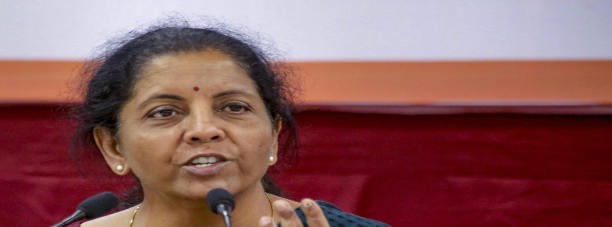
Stating that Indian banks will become bigger, by getting smaller, Finance Minister Nirmala Sitharaman said the number of Public Sector Banks will now be reduced to 12 from 18.
The move comes two years after the government gave an in-principle approval for bank mergers in August, 2017.
Stating that Indian banks will become bigger, by getting smaller, Finance Minister Nirmala Sitharaman said the number of Public Sector Banks (PSBs) will now be reduced to 12 from 18. According to Rajiv Kumar, Secretary, Department of Financial Services, Friday's decision is the final banking consolidation drive and the government will re-open the merger book only if the need persists much later.
Until recently, only six of the 18 PSBs were profitable, but as on June, that number jumped to 14. The remaining four banks are still under the RBI's Prompt Corrective Action.
The move comes just a year after the government undertook a pilot-of-sorts, merging three banks - Bank of Baroda, Vijaya Bank and Dena Bank. The successful integration and synergies seen from this merger emboldened the government to rollout what is perhaps the biggest consolidation drive in Indian banking history.
As per the announcement, Punjab National Bank, Oriental Bank of Commerce and United Bank will merge together to emerge as the second largest state-run lender, while two banks with a predominant presence in the south - Canara Bank and Syndicate Bank - will evolve into a single entity, which will also be the country's third largest.
Likewise, Union Bank of India, Andhra Bank and Corporation Bank will merge to emerge as the fifth largest bank, followed by Indian Bank and Allahabad Bank, which will come together to be the seventh largest PSB.
Revealing the thought process behind the mergers, Sitharaman said these weren't announced simply for the sake of merging, but after duly considering the synergies the banks will have.
First among the factors was to merge banks that have common technology platforms together to avoid disruption of services to customers. Besides, other aspects like CASA (Current and Savings Account Ratio), regional presence and cultural practices were also taken into consideration.
Going forward, first banks will have to get approvals from their respective boards for the merger. Subsequently, approvals from regulatory bodies including RBI, Sebi will also be sought after which the merger process will begin.
While the finance ministry refrained from commenting on the timeline by when the entire process will be completed, going by precedents, it'll take nothing less than 6-12 months.
Meanwhile, Sitharaman also said that last week's announcement of front loading Rs 70,000 crore capital infusion of the banks has already been set in motion. While PNB will get approximately Rs 16,000 crore, Union Bank will receive Rs 11,500 crore, Bank of Baroda Rs 7,000 crore, Canara Bank Rs 6,500 crore, United Bank Rs 11,700 crore, Uco Bank Rs 2,100 crore, Indian Overseas Bank Rs 3,000 crore besides others. "These are approximate numbers and once the banks submit the actual requirement, we will infuse the same," she explained.
Meanwhile, the finance ministry also announced significant governance reforms for PSBs, including appointing chief risk officers at each bank at market-linked compensation to ensure that risk assessment while sanctioning loans is followed thoroughly. Such a move will help prevent the NPA rot from repeating.
Meanwhile, gross NPAs of PSBs reduced from Rs 8.65 lakh crore in December, 2018 to Rs 7.9 lakh crore, while loan recoveries rose from Rs 78,000 crore in FY18 to Rs 1,21 lakh crore in FY19.


.jpeg)

